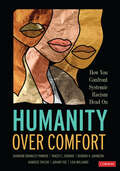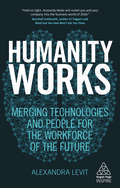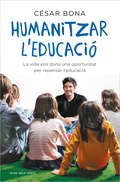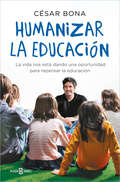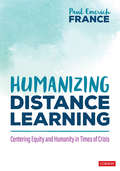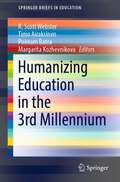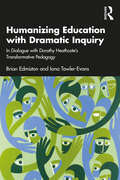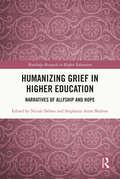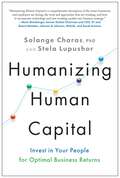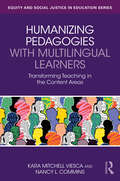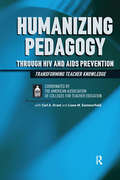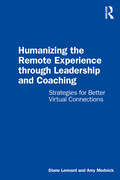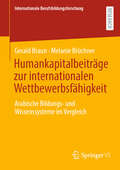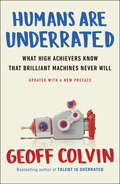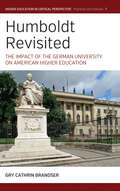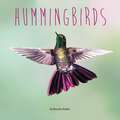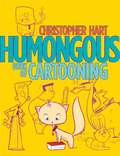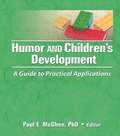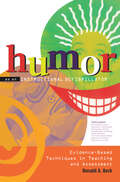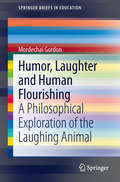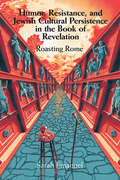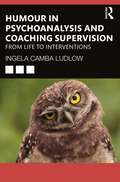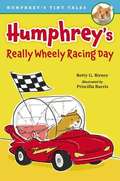- Table View
- List View
Humanity Over Comfort: How You Confront Systemic Racism Head On
by Kendra V. Johnson Lisa N. Williams Sharone Brinkley-Parker Tracey L. Durant Kandice Wilson Taylor Johari ToeIncrease your racial equity capacity for transformational change The years 2020 - 2021 will be remembered for COVID-19 and racial injustice. COVID illuminated long-standing structural inequities. Increased media focus on police brutality helped fuel a protest movement that underscored the urgency of the moment. In schools, non-profits, and various business sectors, conversations about race and institutional racism are becoming increasingly common. However, most of these conversations are performative and do little to disrupt the status quo. The authors of Humanity Over Comfort aim to move beyond the transactional response of using only conversations to respond to structural inequalities. Alternatively, the authors advance tools that promote transformational change that eliminates the access and opportunity gaps for Black and Brown individuals. Written to cultivate awareness that increases racial equity capacity, this book will help readers Understand historical context and the influence of racism in shaping reality Engage in reflections that connect learning to personal experience Understand the Conscious Anti-Racist Engendering Framework (CARE), which draws from adult learning theory to build community in organizations Leverage one’s span of control to implement practices that incrementally work to dismantle systems of oppressions Direct their increased capacity towards dismantling racially predictable policies and practices Transactional responses to racism perpetuate marginalizing narratives and outcomes and do little to support the humanity of a community, including White members. This book will guide readers towards transformational change to build a system that supports the restoration of our collective humanity.
Humanity Over Comfort: How You Confront Systemic Racism Head On
by Kendra V. Johnson Lisa N. Williams Sharone Brinkley-Parker Tracey L. Durant Kandice Wilson Taylor Johari ToeIncrease your racial equity capacity for transformational change The years 2020 - 2021 will be remembered for COVID-19 and racial injustice. COVID illuminated long-standing structural inequities. Increased media focus on police brutality helped fuel a protest movement that underscored the urgency of the moment. In schools, non-profits, and various business sectors, conversations about race and institutional racism are becoming increasingly common. However, most of these conversations are performative and do little to disrupt the status quo. The authors of Humanity Over Comfort aim to move beyond the transactional response of using only conversations to respond to structural inequalities. Alternatively, the authors advance tools that promote transformational change that eliminates the access and opportunity gaps for Black and Brown individuals. Written to cultivate awareness that increases racial equity capacity, this book will help readers Understand historical context and the influence of racism in shaping reality Engage in reflections that connect learning to personal experience Understand the Conscious Anti-Racist Engendering Framework (CARE), which draws from adult learning theory to build community in organizations Leverage one’s span of control to implement practices that incrementally work to dismantle systems of oppressions Direct their increased capacity towards dismantling racially predictable policies and practices Transactional responses to racism perpetuate marginalizing narratives and outcomes and do little to support the humanity of a community, including White members. This book will guide readers towards transformational change to build a system that supports the restoration of our collective humanity.
Humanity Works: Merging Technologies and People for the Workforce of the Future (Kogan Page Inspire)
by Alexandra LevitThe professional landscape is transforming, and the only way to maintain competitive advantage is to maximize the unique skills of your workforce. In Humanity Works, bestselling author, global workplace consultant and futurist Alexandra Levit provides a guide to making the most of the human traits of creativity, judgement, problem solving and interpersonal sensitivity. Revealing what the 'robot takeover' will really look like, how talent and machines can work side by side and how you can make organizational structures more agile and innovation focused, this book will prepare you to lead organizations of the future.Humanity Works doesn't just explain the fascinating trends of the future of work; it condenses cutting-edge academic and business thinking to show what you can do about the future right now. Original, real-life case studies including Nestle, The Washington Post, Deloitte, and Pepsi combined with exercises and workplace tools will equip you for staying innovative and successful in the wake of major workplace disruption. Everything hinges on capturing the human edge in your organization.
Humanitzar l'educació: La vida ens dona una oportunitat per repensar l'educació
by César BonaLa vida ens dona una oportunidad per repensar l'educació. La situació que hem viscut ha mostrat les febleses del sistema educatiu i ha posat de manifest que es troba molt lluny de la realitat. S'ha revelat la inflexibilitat del currículum, que cal adaptar-lo a la realitat, i no a l'inrevés. Els verbs que s'han sentit més aquests mesos quan es parlava d'educació són "avaluar" i "examinar", i el que hem d'analitzar és el sistema. Així que, en lloc de buscar diferents respostes a les preguntes de sempre, potser hem de canviar les preguntes: quines eines necessiten els nens i les nenes? Quines mancances trobem en l'educació que hem rebut?Servirà el que hem viscut per reflexionar o tornarem a l'educació prepandèmia com si no hagués passat res? Hem d'aprofitar aquest moment per replantejar-nos l'educació que volem: si hi ha alguna cosa clara és que tot comença en l'educació.
Humanizar la educación: La vida nos está dando una oportunidad para repensar la educación
by César BonaLa vida nos está dando una oportunidad para humanizar la educación. La situación que hemos vivido ha mostrado los descosidos del sistema educativo y ha puesto de manifiesto lo alejado que este se halla de la realidad. Se ha desvelado la inflexibilidad del currículo: es este el que ha de adaptarse a la realidad, no al revés. Estos meses, al hablar de educación, los verbos que más se han escuchado han sido examinar y evaluar. Es la vida la que nos está poniendo a prueba, y lo que tenemos que evaluar es el sistema. Así que, en lugar de buscar diferentes respuestas a las preguntas de siempre, quizá debamos cambiar las preguntas: ¿qué herramientas necesitan los niños y las niñas? ¿Qué carencias encontramos en la educación que hemos recibido? ¿Servirá lo que hemos vivido para reflexionar o volveremos a la educación prepandemia como si nada hubiera pasado? Tenemos que aprovechar este momento para replantearnos la educación que queremos: si hay algo que está claro, es que todo comienza en la educación. Los lectores comentan...«César aporta autenticidad.» «Inspirador.» «Muestra que otra educación es posible.» «Altamente recomendable si quieres encontrar una razón o muchas para ser maestro.» «Contagia las ganas de trabajar mejor.» «Simplemente increíble.» «Totalmente recomendado a todos aquellos que trabajamos en el mundo educativo.» «Te hace reflexionar.»
Humanizing Distance Learning: Centering Equity and Humanity in Times of Crisis
by Paul Emerich France"In some ways, shouldn′t we always be teaching from a distance?" Paul France asks this not as pitch for distance learning. But because part of the reason distance learning has been so challenging, Paul asserts, is that we’re replicating long-standing practices that promote dependent learning in our students. Why not use this unique moment of time to reconnect with the true purpose of teaching: to help our students become liberated learners and free thinkers? The next logical step in teachers’ months-long distance learning "journey," Humanizing Distance Learning describes how to center humanity and equity in our process of reimagining learning. Even while teaching and learning miles apart through screens, you’ll discover how to Build independence within your students so they’re better equipped to tackle challenges with persistence and learn how to learn Make collaboration and human connection essential components of your pedagogy, offering students the chance to socialize and learn from one another Center and unpack students’ identities, helping them develop a conscious knowledge of themselves, all the while using their self-identified strengths to overcome any obstacles Plan, prepare, and implement humanized instruction while teaching for student liberation—both digitally and in person. Investigate technology integration, including the Digital Divide, as well as ways to minimize EdTech integration so that our collective sense of humanity can continue to be front and center "The future," Paul writes, "may be unclear, the road may be rocky, and the story may continue to be long and winding as we push forward through this global crisis. But the answer will always be simple: We must teach and learn in pursuit of a deeper sense of collective humanity—and for no other reason." "This book is equal parts visionary and practical, courageous and invitational. It addresses foundational needs and wrenching challenges teachers faced during the recent time when U.S. teachers abruptly found themselves teaching remotely. . . . It is a deeply humanizing book." ~Carol Ann Tomlinson, William Clay Parrish, Jr. Professor Emeritus, University of Virginia "Humanizing Distance Learning is a book for our times not only because it addresses how to build a culture of thinking and teach for understanding at a distance, but also because it challenges the status quo of education by offering a more liberated and humane vision." ~Ron Ritchhart, Senior Research Associate, Harvard Graduate School of Education "Paul France has produced a timely and necessary book that will help educators humanize distance learning. Recognizing incredible dimensions of complexity, this book will surely help educators traverse times of uncertainty in distance learning."</spa
Humanizing Distance Learning: Centering Equity and Humanity in Times of Crisis
by Paul Emerich France"In some ways, shouldn′t we always be teaching from a distance?" Paul France asks this not as pitch for distance learning. But because part of the reason distance learning has been so challenging, Paul asserts, is that we’re replicating long-standing practices that promote dependent learning in our students. Why not use this unique moment of time to reconnect with the true purpose of teaching: to help our students become liberated learners and free thinkers? The next logical step in teachers’ months-long distance learning "journey," Humanizing Distance Learning describes how to center humanity and equity in our process of reimagining learning. Even while teaching and learning miles apart through screens, you’ll discover how to Build independence within your students so they’re better equipped to tackle challenges with persistence and learn how to learn Make collaboration and human connection essential components of your pedagogy, offering students the chance to socialize and learn from one another Center and unpack students’ identities, helping them develop a conscious knowledge of themselves, all the while using their self-identified strengths to overcome any obstacles Plan, prepare, and implement humanized instruction while teaching for student liberation—both digitally and in person. Investigate technology integration, including the Digital Divide, as well as ways to minimize EdTech integration so that our collective sense of humanity can continue to be front and center "The future," Paul writes, "may be unclear, the road may be rocky, and the story may continue to be long and winding as we push forward through this global crisis. But the answer will always be simple: We must teach and learn in pursuit of a deeper sense of collective humanity—and for no other reason." "This book is equal parts visionary and practical, courageous and invitational. It addresses foundational needs and wrenching challenges teachers faced during the recent time when U.S. teachers abruptly found themselves teaching remotely. . . . It is a deeply humanizing book." ~Carol Ann Tomlinson, William Clay Parrish, Jr. Professor Emeritus, University of Virginia "Humanizing Distance Learning is a book for our times not only because it addresses how to build a culture of thinking and teach for understanding at a distance, but also because it challenges the status quo of education by offering a more liberated and humane vision." ~Ron Ritchhart, Senior Research Associate, Harvard Graduate School of Education "Paul France has produced a timely and necessary book that will help educators humanize distance learning. Recognizing incredible dimensions of complexity, this book will surely help educators traverse times of uncertainty in distance learning."</spa
Humanizing Education in the 3rd Millennium (SpringerBriefs in Education)
by R. Scott Webster Timo Airaksinen Poonam Batra Margarita KozhevnikovaThis book proposes some insights and ideas into how education might be humanized. The chapters inform, provoke, and guide further inquiries into imagining and actualizing human education. It presents the view that education should be primarily understood as human education, which offers universal good for the entire planet. It centres around the significant values that make life, in a holistic sense, meaningful, worthwhile, and socially just. It discusses the fundamental idea that human education is the key to peace, individual and social freedoms, social justice and harmony, fraternity and happiness all over the world, and how educational ideals and methods must be reconsidered to achieve this end.This book originates from an international conference and round-table, “Human Education in the 3rd Millennium,” in July 2019 in Dharamsala, India.
Humanizing Education with Dramatic Inquiry: In Dialogue with Dorothy Heathcote’s Transformative Pedagogy
by Brian Edmiston Iona Towler-EvansHumanizing Education with Dramatic Inquiry provides a comprehensive rationale for why and how dramatic inquiry can be used by any teacher to humanize classroom communities and the subject areas being explored with students. Written by teacher educators Brian Edmiston and Iona Towler-Evans, the book re-evaluates the radical humanizing dramatic enquiry pedagogy of British educator Dorothy Heathcote, as developed by the authors in their own teaching using her three approaches: Process Drama, Mantle of the Expert, and the Commission Model. Through scholarly yet practical analysis of extended examples drawn from their own classroom teaching, the volume demonstrates how teachers can collaborate with students of all ages, dispositions, presumed abilities, and cultural backgrounds to transform classroom life into a richly humanizing, curious, inquiring, imaginative community. This book will appeal to educators and teacher educators not only those open to using drama pedagogies in classrooms and in therapy but also to those engaged in applied theatre. Additionally, it will interest those in literacy and education in general who are committed to inclusive, critical, antiracist, anti-oppressive, and artistic practices.
Humanizing Grief in Higher Education: Narratives of Allyship and Hope (Routledge Research in Higher Education)
by Stephanie Anne Shelton Nicole SiebenBy showcasing asset-based approaches inspired by individual reflection, research, and experience, this volume offers a fresh and timely perspective on grief and trauma within higher education and illustrates how these approaches can serve as opportunities for hope and allyship. Featuring a broad range of contributions from scholars and professionals involved in educational research and academia, Humanizing Grief in Higher Education explores the varied ways in which students, scholars, and educators experience and navigate grief and trauma. Set into four distinct parts, chapters deploy personal narratives situated within interdisciplinary and transdisciplinary research frameworks to illustrate how issues such as race, gender, socio-economic class, and politics intersect with experiences of personal and professional grief in the academy. A variety of intersectional fields of study – from positive psychology, counselling, feminist and queer theories, to trauma theory and disability studies – inform an interdisciplinary framework for processing traumatic experiences and finding ways to hope. These narrative explorations are positioned as key to developing a sense of hope amongst the grieving and those supporting them. This text will benefit researchers, doctoral students, and academics in the fields of Higher Education, teacher education, trauma studies, and mental health education. Those interested in positive and educational psychology, as well as grief counselling in adults, will also enjoy this volume. Finally, this collection serves as a companion for those who find themselves grappling with losses, broadly defined.
Humanizing Human Capital: Invest in Your People for Optimal Business Returns
by Stela Lupushor Solange CharasThe work world is changing faster than ever before. Adapting to this new reality without a significant interruption in results is increasingly a top priority for all businesses. The key to thriving through disruption is understanding and practicing human capital strategies that will drive enterprise performance and value-creation. In Humanizing Human Capital, renowned business thought leaders Solange Charas, PhD, and Stela Lupushor reframe traditional HR practices into a future-forward strategy to optimize human capital. Charas and Lupushor shift decision-making about people from a gut sense to an evidence-based approach—a critical and much-needed departure from the cross-your-fingers-and-hope-for-the-best approach of most traditional HR programs today. Humanizing Human Capital reveals a step-by-step method to apply analytics approaches to human capital while anticipating inevitable changes in the workforce landscape. This will enable human capital professionals to generate positive outcomes for all stakeholders and allow management to make decisions that work for the entire enterprise. With this book&’s comparison of &“traditional&” with the &“future-forward&” approach to human capital management, case studies, real-world situations, and 20 business principles, you will learn to: Adopt a best-evidence versus best-practice approach to decision making Shift your thinking so that you view human capital as a crucial investment rather than as a sunk cost Identify what needs to change to respond to future pressures and apply critical thinking to create workable solutions Balance human capital analytics with the more human-centric elements of people management Equip yourself with approaches and tools to interpret the collective voice of the workforce Utilize methods to measure and optimize human capital efficiency, increasing your ROI Increase value for all key stakeholders, including investors, management, workers, customers, partners, and the community at large The road ahead may seem unpredictable and even treacherous, but Humanizing Human Capital provides leaders of any organization a new framework to create resilient, responsive, and innovative organizations with tangible and sustainable business results.
Humanizing Pedagogies with Multilingual Learners: Transforming Teaching in the Content Areas (Equity and Social Justice in Education Series)
by Kara Mitchell Viesca Nancy L. ComminsHelp ensure your multilingual students have access to equitable, humanizing teaching and learning in all the content areas. This comprehensive resource bridges theory into practice with applicable, easy-to-understand instructional methods for K-12 teachers who may not have a background in TESOL, ESL, or bilingual education. Each chapter uses a three-part learning cycle to help you translate theory into practice: Explore, Make It Work, and Share. In Explore, the authors provide research, ideas, and resources to support your work with multilingual students. In Make It Work, you are given options to take the ideas from Explore and apply them to your practice. And in Share, you’re encouraged to think about the ways to share your knowledge in informal or formal professional learning spaces. As you work through the learning cycle for each module, you’ll gain important takeaways on topics such as the larger social context, a positive orientation to your students, humanizing assessments, grouping students, uncovering and addressing language demand, developing conceptual understandings, developing literacy, and fostering authentic talk. The book’s hands-on approach to pedagogy will leave you feeling ready and empowered to reach each of your multilingual students more effectively as you strive for equity and justice in the classroom and beyond.
Humanizing Pedagogy Through HIV and AIDS Prevention: Transforming Teacher Knowledge
by American Association of Colleges for Teacher EducationThis book explores the power of educators to serve as HIV and AIDS prevention agents. The definitive text represents the work of a distinguished panel of teacher educators and health scientists who identify core information and skills effective educators of HIV and AIDS prevention should learn as they are prepared to attend to the academic and human needs of students. It assigns to teachers, in the US and abroad, the novel role of prevention agents, given their extraordinary ability to access and affect young people -- to influence their behavior. Humanizing Pedagogy considers the social, economic, racial, gender and other variables that impact the prevention of HIV and AIDS. The authors collectively assert that the process of preventing HIV and AIDS, when it considers historic and social context, can compel educators to serve not only as practitioners of knowledge, but as community agents of health and well being. Attending to HIV and AIDS issues advances the capacity and ability of educators to see and attend to the complete learner. Humanizing Pedagogy is a single volume resource for educators, in the US and abroad, interested in attending to the whole needs of the learner-and saving lives.
Humanizing the Remote Experience through Leadership and Coaching: Strategies for Better Virtual Connections
by Diane Lennard Amy MednickThis book responds to the growing need for understanding how we can foster wellness, raise engagement, and strengthen connections in professional contexts as human interactions become increasingly remote. Through research and case studies, the authors outline a paradox: the digital technology we use to connect with others can leave us feeling less connected. To understand what is missing from remote interactions, the authors examine the use of space, sensory cues, group dynamics, and challenges people encounter when the innate need for human connection is unmet. They provide practical advice to improve remote experiences, including ways to manage stress, avoid cognitive overload, and prevent burnout. Ultimately, the book highlights what is possible when we focus not only on the quantity and efficiency of our interactions, but also on the quality and depth of our human connections. The contemporary relevance of this topic makes the book essential for leaders, coaches, consultants, and other professionals working remotely, as well as students and interested individuals seeking to improve their personal and professional remote experiences.
Humankapitalbeiträge zur internationalen Wettbewerbsfähigkeit: Arabische Bildungs- und Wissenssysteme im Vergleich (Internationale Berufsbildungsforschung)
by Gerald Braun Melanie BrüchnerAls integraler Bestandteil der Weltgesellschaft ist die arabische Staatengemeinschaft in den kommenden Jahrzehnten mit präzedenzlosen Herausforderungen, aber auch Chancen konfrontiert. Die globalen ökonomischen Herausforderungen haben gemeinsam, dass sie nachhaltige und substantielle Investitionen in die „Ressource“ Mensch erfordern. In von Wissen getriebenen Ökonomien muss das Bildungs- und Erziehungswesen jene Kompetenzen produzieren, die notwendig sind, um in einer wissensbasierten Weltökonomie zu reüssieren. Humankapitalbeiträge gewinnen somit nicht nur für die internationale Wettbewerbsfähigkeit einer Volkswirtschaft an überragender Bedeutung – sie werden zugleich zum universalen Zugangskriterium für wirtschaftliche und gesellschaftliche Teilhabe. Die Publikation arbeitet mit Hilfe eines bildungsökonomisch adaptierten Diamant-Modells von Michael Porter den Beitrag nationaler Bildungs- und Wissenssysteme zur internationalen Leistungs- und Wettbewerbsfähigkeit arabischer Länder heraus, positioniert und vergleicht sie.
Humans Are Underrated: What High Achievers Know That Brilliant Machines Never Will
by Geoff ColvinAs technology races ahead, what will people do better than computers?What hope will there be for us when computers can drive cars better than humans, predict Supreme Court decisions better than legal experts, identify faces, scurry helpfully around offices and factories, even perform some surgeries, all faster, more reliably, and less expensively than people?It’s easy to imagine a nightmare scenario in which computers simply take over most of the tasks that people now get paid to do. While we’ll still need high-level decision makers and computer developers, those tasks won’t keep most working-age people employed or allow their living standard to rise. The unavoidable question—will millions of people lose out, unable to best the machine?—is increasingly dominating business, education, economics, and policy.The bestselling author of Talent Is Overrated explains how the skills the economy values are changing in historic ways. The abilities that will prove most essential to our success are no longer the technical, classroom-taught left-brain skills that economic advances have demanded from workers in the past. Instead, our greatest advantage lies in what we humans are most powerfully driven to do for and with one another, arising from our deepest, most essentially human abilities—empathy, creativity, social sensitivity, storytelling, humor, building relationships, and expressing ourselves with greater power than logic can ever achieve. This is how we create durable value that is not easily replicated by technology—because we’re hardwired to want it from humans.These high-value skills create tremendous competitive advantage—more devoted customers, stronger cultures, breakthrough ideas, and more effective teams. And while many of us regard these abilities as innate traits—“he’s a real people person,” “she’s naturally creative”—it turns out they can all be developed. They’re already being developed in a range of far-sighted organizations, such as: • the Cleveland Clinic, which emphasizes empathy training of doctors and all employees to improve patient outcomes and lower medical costs; • the U.S. Army, which has revolutionized its training to focus on human interaction, leading to stronger teams and greater success in real-world missions; • Stanford Business School, which has overhauled its curriculum to teach interpersonal skills through human-to-human experiences. As technology advances, we shouldn’t focus on beating computers at what they do—we’ll lose that contest. Instead, we must develop our most essential human abilities and teach our kids to value not just technology but also the richness of interpersonal experience. They will be the most valuable people in our world because of it. Colvin proves that to a far greater degree than most of us ever imagined, we already have what it takes to be great.From the Hardcover edition.
Humboldt Revisited: The Impact of the German University on American Higher Education (Higher Education in Critical Perspective: Practices and Policies #7)
by Gry Cathrin BrandserHumboldt Revisited offers a fresh perspective on the contemporary discourse surrounding reform of European universities. Arguing that contemporary reform derives its basis from pre-constructed truths about the so-called ‘Humboldt-university,’ this monograph traces the historical descent of these truths to the American reception of Humboldt's ideas from the mid-19th century up until the 1960s. Drawing from a rich selection of historical sources, this volume offers an alternative to conventional explanations of the forces behind the ongoing reform of European universities. It also challenges the conventional historical narrative on the Humboldt University, providing new insight into the American reception of the German ideas.
Hummingbirds (Penguin Core Concepts Ser.)
by Bonnie BaderHummingbirds are some of the most beautiful, tiniest birds in nature. They are the only creatures that can fly forward, backward, sideways—even upside down! Their hearts beat anywhere from 500 to 1200 times every minute; their wings flap as many as 52 times per second; and they breathe up to 600 times per minute. This fact-and-photo-filled nonfiction 8x8 will leave readers astounded by the smallest bird in America!
Humongous Book of Cartooning (Christopher Hart's Cartooning)
by Christopher HartChris Hart's Humongous Book of Cartooning is a great value book covering everything the beginner needs to master cartooning. It teaches how to draw cartoon people, fantasy characters, layouts, background design and much more. This latest cartoon title from Chris Hart, the world's bestselling author of drawing and cartooning books, packs a wallop. It's the cartooning book that has it all: cartoon people, animals, retro-style "toons'", funny robots (no one has ever done cartoon robots in a how-to book before, and movies like "Wall-E" and "Robots" were smash hits and prove their appeal), fantasy characters and even sections on cartoon costumes, character design, and cartoon backgrounds and composition. The Humongous Book of Cartooning is humongous, not only because it's so big, but also because it includes a huge amount of original eye-catching characters and copious visual "side hints" that Chris is famous for. There is more actual instruction in this book than in any other of Chris' cartooning titles. In short, if you want to know how to draw cartoons, Chris Hart's Humongous Book of Cartooning is for you.From the Trade Paperback edition.
Humor and Children's Development: A Guide to Practical Applications
by Paul E Mcghee Mary FrankHere is the first book that is geared toward practical applications of humor with children. Health care professionals, counselors, social workers, students, and parents will find this to be a fascinating, instructive volume that illustrates how to effectively incorporate humor into children’s lives to produce enormously positive results. With a strong “how to” focus, this enlightening volume addresses the use of humor in the classroom--to promote learning and to foster higher levels of creative thinking. Experts who are on the cutting edge of humor and its benefits for children examine the importance of humor in fostering social and emotional development and in adapting to stressful situations. And for the scholarly reader, Humor and Children’s Development documents the major research trends focusing on humor and its development. This excellent resource--certain to spark further debate and research--offers an unrivaled opportunity to further understand children’s behavior and development.Humor and Children’s Development was featured in the February 1990 issue of Working Mother magazine in article titled “Let Laughter Ring!” by Eva Conrad.The chapter entitled “Humor in Children’s Literature” by Janice Alberghene was one of the finalists for the Children’s Literature Association’s Literary Criticism Award for the best critical article of 1988 on the subject of children’s literature.
Humor as an Instructional Defibrillator: Evidence-Based Techniques in Teaching and Assessment
by Ronald A. BerkGrab those paddles. Charge 300. Clear! "Ouch!" Now how do you feel? "Great!" Humor can be used as a systematic teaching or assessment tool in your classroom and course Web site. It can shock students to attention and bring deadly, boring course content to life. Since some students have the attention span of goat cheese, we need to find creative online and offline techniques to hook them, engage their emotions, and focus their minds and eyeballs on learning. This book offers numerous techniques on how to effectively use humor in lectures and in-class activities, printed materials, course Web sites and course tests and exams.These techniques can convert any course into an adult version of Sesame Street. "If Dr. Hannibal Lecter ate books, this one would make a tasty hors d' oeuvre." -- Clarice Starling"A non-page-turning marvel...I could stop reading at any point and know I 'm not missing anything." -- Forrest Gump"Not as much fun as Quidditch, but would be required reading for faculty at the Hogwarts School." -- Harry Potter"How did you get this book published? Read my letters: YOUR KNOT FUNY!" -- Bart Simpson
Humor, Laughter and Human Flourishing: A Philosophical Exploration of the Laughing Animal
by Mordechai GordonThis book is a philosophical investigation of the significance of humor and laughter, examining its relation to other human phenomena including truth, nihilism, dreams, friendship, intimacy, aesthetic experience, self-transcendence and education. The author addresses the relative neglect of humor and laughter among philosophers of education with this volume, where the focus is on the significance of humor and laughter for human flourishing. Central questions are threaded through this work: What does the study of humor and laughter bring to philosophy and specifically to philosophy of education? How is humorist thinking different from other modes of human knowing? What might happen if we were to respond to the absurdity of human existence with humor and laughter? What insights can be learned from a philosophical investigation of humor in relationship to other human phenomena such as dreams, friendship, intimacy, aesthetic experience and self-transcendence? And, finally, how can humor and laughter enhance human existence and flourishing? The author presents groundbreaking insights into what can be gained from a study of humor and laughter about human existence in general and flourishing in particular. This work will be of interest to philosophers, especially philosophers of education, as well as to teachers and educators. Its unique blend of philosophical investigation and humorous discourse is both a rigorous and accessible analysis of humor.
Humor, Resistance, and Jewish Cultural Persistence in the Book of Revelation: Roasting Rome
by Sarah EmanuelEmpire-critical and postcolonial readings of Revelation are now commonplace, but scholars have not yet put these views into conversation with Jewish trauma and cultural survival strategies. In this book, Sarah Emanuel positions Revelation within its ancient Jewish context. Proposing a new reading of Revelation, she demonstrates how the text's author, a first century CE Jewish Christ-follower, used humor as a means of resisting Roman power. Emanuel uses multiple critical lenses, including humor, trauma, and postcolonial theory, together with historical-critical methods. These approaches enable a deeper understanding of the Jewishness of the early Christ-centered movement, and how Jews in antiquity related to their cultural and religious identity. Emanuel's volume offers new insights and fills a gap in contemporary scholarship on Revelation and biblical scholarship more broadly.
Humour in Psychoanalysis and Coaching Supervision: From Life to Interventions
by Ingela Camba LudlowDrawing from psychoanalytic principles, Ingela Camba Ludlow uniquely explores and endorses humour as a serious and essential practical tool in coaching, coaching supervision and psychotherapy, showing how, when successfully integrated, it can help clients navigate the most difficult professional and personal challenges. Often misunderstood and not accepted in the academic arena, chapters in Part 1 begin by looking at the history and evolution of humour from the Ancient Greeks to the modern age, distinguishing different types of humour from each other, such as wit, sarcasm and pantomime. Freud believed humour to be the highest mechanism of the human psyche and the book continues to examine his relationship and use of humour in psychotherapy, looking at his personal correspondence and patient testimonials as well as how his contemporaries, such as Bion, applied humour in their practice. Moving from theory to practice, chapters in Part 2 show practitioners through case studies, exercises and examples how they can use humour in sessions with clients. Specifically addressing how to use humour ethically, how to remain neutral as the coach and how to use humour to address anxiety, express anger and offer alternative rationalisations, this book provides coaches the practical tools to expand their coaching practice. This interdisciplinary book will be essential reading for coaches, psychotherapists and counsellors looking to broaden their coaching supervision skill set, as well as those who are interested in how humour can promote personal and professional development through a psychoanalytic lens.
Humphrey's Really Wheely Racing Day
by Betty G. Birney Priscilla BurrisEveryone's favorite classroom pet is now starring in chapter books! Humphrey is one happy hamster. He lives in Room 26 at Longfellow School. He has a big comfy cage with a wheel perfect for spinning and a room full of friends. But when Humphrey goes to Mandy's house one weekend, he learns that her hamster has something Humphrey has never seen before--a hamster car! Humphrey wants one, too, but school is not usually the place for toys. Then his teacher talks about bringing in something special for a project. Is Humphrey getting a really wheely surprise? With adorable illustrations and an easy reading level, Humphrey's Tiny Tales are just right for emergent readers.
